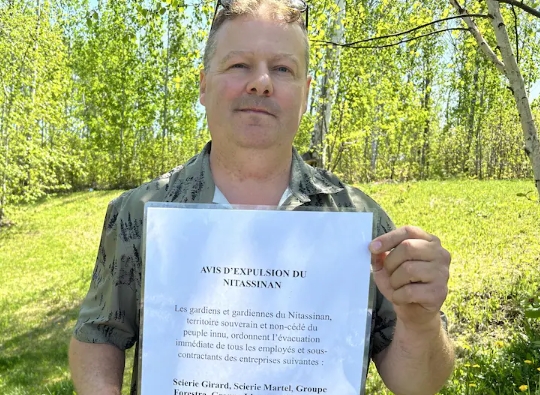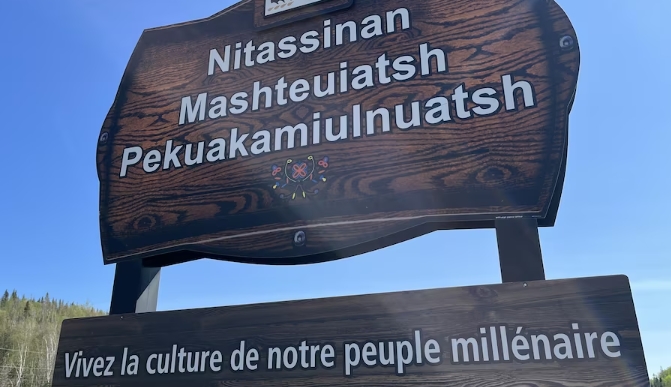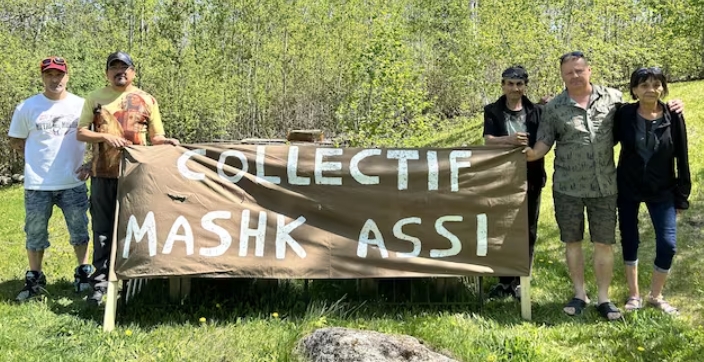The Collectif Mashk Assi, along with the protectors of the Innu ancestral land, are determined to demand an immediate cessation of logging activities in the northern region of the Laurentides wildlife reserve and the watershed of Lake Kénogami in Saguenay.
During the weekend, activists took advantage of the logging sites being inactive to attach eviction notices onto the harvesters. Their demand is for a temporary halt to all logging activities. The protectors of Nitassinan, the sovereign and unceded territory of the Innu people, have issued an order for the immediate departure of all employees and subcontractors from the following companies: Scierie Girard, Scierie Martel, Groupe Forestra, Groupe Lignarex, Scierie du Lac-Saint-Jean, Resolute Forest Products, Cooperative Forestry Ferland-Boilleau. These instructions can be read on the posters displayed.
The Innu community issues a stern warning that starting from May 30th, companies will be strictly prohibited from accessing their ancestral territory, except for the purpose of retrieving their equipment. Failure to comply with this directive will result in potential legal consequences. Michael Paul, a renowned artist from Mashteuiatsh known for his dedicated music focused on environmental preservation, forests, and the sanctity of Mother Earth’s water, is actively involved in this group. As a symbolic representation of their ancestral presence, he has erected wooden structures resembling tepees on the logging sites.

“In our culture, we believe that trees possess a living spirit. The preservation of old growth forests holds great significance. With the displacement of animals, they are left with nowhere to go. Our identity is deeply intertwined with the forests and biodiversity; it is a profound relationship. Unfortunately, these individuals fail to take us seriously. They perceive the forest solely in terms of profits and monetary gain, lacking the same perspective as us. That is precisely why we stand here today,” Mr. Paul adds.
Identifying himself as an Innu guardian and a hunter-gatherer from the Belle-Rivière region, he announces that the forestry companies, the Quebec government, and the Canadian government will each receive an official eviction notice via registered mail on Monday morning.
“We have not granted our consent, and we will continue to withhold it. We vehemently oppose any logging activities. For years, our voices have gone unheard. We have reached a critical juncture, a point of no return. This is a matter of survival,” proclaims activist Michael Paul passionately.
According to the Collectif Mashk Assi, the forest industry’s operations near the Rivière aux Écorces, the Pikauba River, and the Belle-Rivière region are deemed illegal. The families who serve as guardians of the land have not been consulted, in violation of their inherent rights that span millennia. The eviction notice explicitly states:
“Through the destruction of our forests, you not only jeopardize our living environment but also violate our fundamental right to pass on our territory, our identity, and our ancestral way of life to future generations.”

The Innu community expresses deep sorrow over the planned logging activities near a designated heritage site that holds immense cultural significance for the First Nations. This site encompasses gathering areas and burial grounds of their ancestors. Denise Xavier, a member of the collective, expresses regret witnessing the desecration of these sacred places by heavy machinery.
Ms. Xavier shares a heart-wrenching account, saying:
“It’s right by our home. My great-grandfather rests there. When my father went to visit, he couldn’t even recognize the place anymore because all the trees were gone.”
The Indigenous people residing on Nitassinan, where they also engage in hunting, lend their support to the protected area initiative aimed at safeguarding the regions facing logging activities south of Lake Kénogami. Michael Paul highlights that the Mashteuiatsh Band Council lacks jurisdiction over this traditional Innu territory situated beyond the reserve boundaries. He emphasizes that the guardians of Nitassinan have never relinquished their ancestral rights, neither through treaties nor conquest.
“Failure to comply with this eviction order will result in legal repercussions for violating our inherent human and ancestral rights. We view the denial of our sovereignty and the exploitation of our land as a continuation of the genocide against Indigenous peoples,” states the Collectif Mashk Assi.
“The guardian families of Nitassinan demand an immediate cessation of all forestry activities and insist that you vacate our territory without delay. Your presence on Nitassinan constitutes a breach of Innu tipenitamun, the Innu’s sovereignty over the 571,000 km2 of Nitassinan, and uetshit takuaimatishun, the exercise of the Innu people’s self-determination,” further emphasizes the expulsion notice.
Towards a blockage?
Two weeks ago, Michael Paul conveyed the concerns of the Mashk Assi group to the Ministry of Forests and Natural Resources in a letter. They urgently requested the immediate suspension of all forestry activities. Simultaneously, they cautioned the government about their intent to physically shut down the sites and seek legal action through an injunction, if deemed necessary. Regrettably, despite these appeals, numerous citizens have observed that the machinery of forestry companies has remained operational over the past week.
In the event that the collective’s demands continue to be disregarded, the activists affirm that decisive actions will be taken this week, bolstered by the support of the Atikamekw community. Starting from March, the Atikamekw people from Wemotaci have been staging a blockade on a forest road north of La Tuque, as a means of protesting against the logging activities encroaching upon their ancestral land. This blockade complements the existing one that has persisted for over a year in Manawan, the other Atikamekw community located in Haute-Mauricie.

